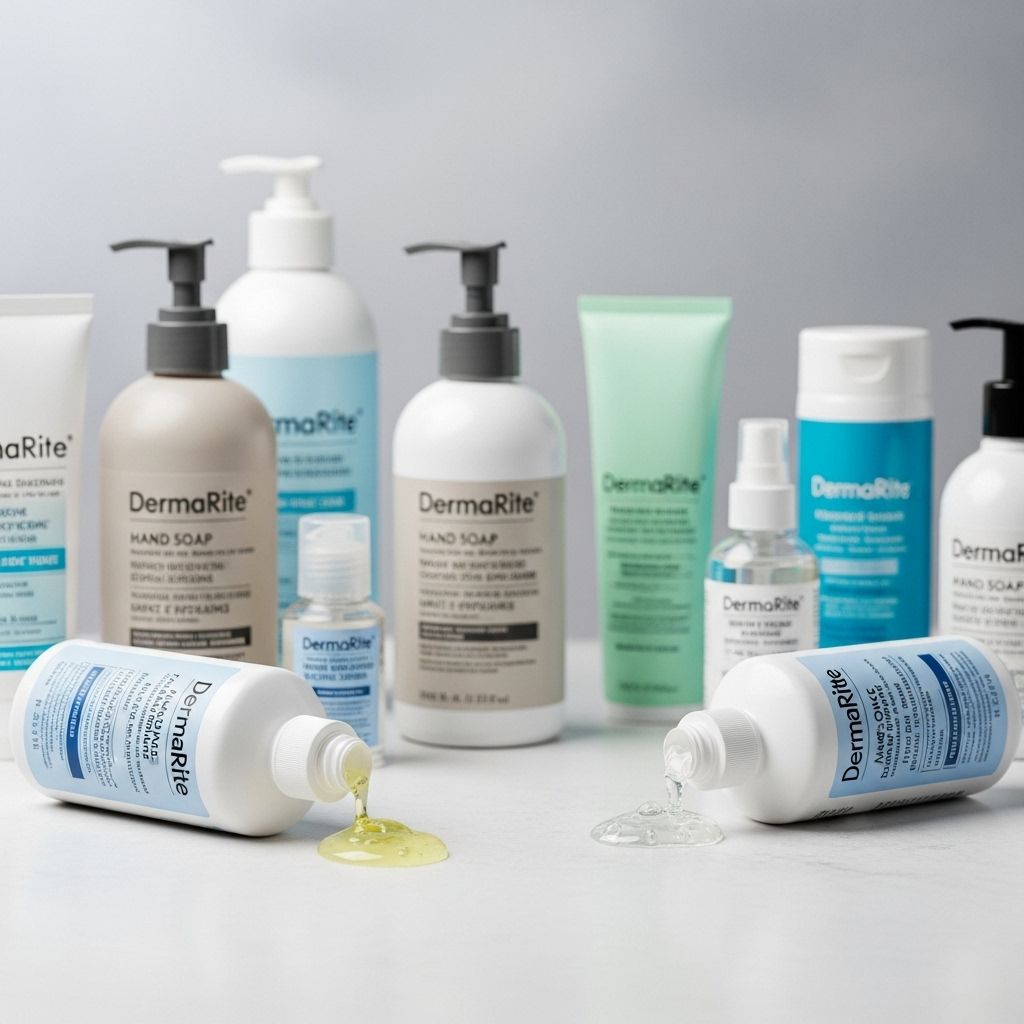Hand Soap and Sanitizer Recall Widens: What to Know About DermaRite’s Bacterial Contamination Alert
Safeguard your daily care routine against hidden bacterial threats in common products.

DermaRite Hand Soap Recall Expands to More Hygiene Products
In a significant development affecting consumers and healthcare providers across the United States and Puerto Rico, DermaRite Industries has issued an expanded recall on dozens of hygiene and skincare products, including not only hand soaps but also hand sanitizers, deodorants, lotions, shampoos, and more. This move comes amid concerns of potential contamination by the bacteria Burkholderia cepacia, which poses unique risks, particularly to individuals with weakened immune systems or those suffering from chronic illnesses.
Originally initiated in July and extended in late August 2025, the recall centers on infection risks and aims to prevent adverse effects, especially in medical and high-risk environments. Here’s a comprehensive look at the recall, its implications, and what you need to do if you have purchased or used any of the affected products.
Table of Contents
- Why Did DermaRite Expand the Recall?
- What is Burkholderia cepacia?
- List of Recalled Products
- Health Risks and Who is Most at Risk?
- DermaRite’s Response and Actions
- What Should Consumers Do?
- Frequently Asked Questions (FAQs)
Why Did DermaRite Expand the Recall?
Concerns first arose in July 2025, when DermaRite voluntarily recalled several of its hand soap and lotion products. The reason: routine testing and subsequent investigations uncovered the presence of Burkholderia cepacia complex (abbreviated Bcc), a group of bacteria that can lead to serious infections, especially in vulnerable populations.
After the initial steps, further scrutiny revealed that other batches and product lines—not just hand soaps—might also be affected. Consequently, on August 27, 2025, DermaRite expanded the recall to include a wider array of items distributed nationwide. The company took this step as a precaution, aiming to prevent potential harm before any widespread reports of illness. The affected lots of these products have expiration dates ranging from July 2025 to August 2027.
What is Burkholderia cepacia?
Burkholderia cepacia is not a single bacterium but a complex comprising several closely related species, often referred to as Bcc. According to the Centers for Disease Control and Prevention (CDC), these bacteria are commonly found in soil and water. While Bcc generally poses minimal risk to healthy individuals, it can cause dangerous infections in people with weaker immune systems, such as patients with cystic fibrosis or those undergoing immunosuppressive therapies.
- Local infections may develop if the bacteria enter the skin through minor injuries.
- For immunocompromised individuals, a Bcc infection can rapidly progress from the skin into the bloodstream, potentially leading to life-threatening sepsis.
- Common symptoms of Bcc infection include fever, fatigue, and worsening of pre-existing respiratory or wound conditions.
The bacteria primarily spread via contact with contaminated surfaces, products, soil, water, and, in rare cases, person-to-person contact.
List of Recalled Products
The expanded recall encompasses a broad range of over 30 DermaRite products, and includes popular hygiene products distributed to both healthcare settings and individual consumers. If you have any of the following items in your possession, check their batch and expiration dates immediately:
| Product Name | Category | Use |
|---|---|---|
| DermaKleen Antiseptic Lotion Soap | Hand Soap | Antimicrobial hand washing |
| Gel Rite Instant Hand Sanitizer | Hand Sanitizer | Instant sanitizing without water |
| Hand-E-Foam Foaming Hand Sanitizer | Hand Sanitizer | Foaming hand sanitizer |
| 4-N-1 No-Rinse Wash Cream | Body Wash/Cleansing Cream | Waterless body cleansing |
| DermaCerin Moisturizing Creams | Skin Moisturizer | Skin hydration/moisturization |
| DermaFungal Antifungal Creams | Topical Antifungal | Skin antifungal treatment |
| DermaMed Skin Protectants | Barrier Cream | Prevents moisture-related skin irritation |
| UltraSure Antiperspirant/Deodorant | Deodorant | Personal hygiene |
| KleenFoam Antimicrobial Foam Soap | Hand Soap | Antimicrobial hand washing |
| Lantiseptic Skin Protectant | Skin Protectant | Prevents and treats skin breakdown |
| PeriGiene Antiseptic Cleanser | Antiseptic Wash | Hygiene cleansing |
| PeriGuard Skin Protectant | Skin Protectant | Moisture barrier for skin |
| Renew Dimethicone Skin Protectant | Moisturizer/Barrier | Skin hydration and protection |
| Renew Periprotect Skin Protectant | Barrier Cream | Perineal skin protection |
| Renew Skin Repair Cream | Repair Cream | Promotes skin healing |
This list is not exhaustive. For a detailed batch and product code listing, consult the company or the FDA’s published list of affected items. Most of the recalled products have expiration dates ranging from July 2025 to August 2027.
Health Risks and Who is Most at Risk?
Burkholderia cepacia poses little threat to most healthy individuals. The main risk is for people with:
- Weakened immune systems (immunocompromised)
- Chronic respiratory diseases (e.g., cystic fibrosis)
- Open wounds, burns, or extensive skin injuries
- Elderly adults or young children in healthcare facilities
Possible consequences include:
- Local skin infections in otherwise healthy users, usually mild and treatable
- Serious systemic infections such as pneumonia or bloodstream infections (sepsis) in vulnerable groups
- Complications in wound or postsurgical care if contaminated products are used
As of the latest updates, DermaRite and the FDA have not received reports of illness directly linked to these recalled products, but users are urged to exercise caution and monitor for symptoms.
DermaRite’s Response and Actions
DermaRite Industries announced the recall proactively and has emphasized its commitment to transparency and consumer safety. Key points from company communications:
- Swift Notification: The company notified distributors and customers, asking them to review their inventories and remove any affected products.
- Customer Service: A dedicated hotline and email are available for affected parties seeking information or returns.
- Product Availability: The company clarified that its wound care and nutritional lines are not impacted by this recall and remain safe for continued use.
- Transparency and Accountability: In public statements, DermaRite has expressed regret for the inconvenience and confirmed its ongoing cooperation with the U.S. Food and Drug Administration (FDA).
“Our actions reflect our dedication to acting quickly, transparently, and responsibly, so that we can maintain the highest standards of care,” said a spokesperson from DermaRite.
What Should Consumers Do?
If you or your facility has purchased any potentially affected DermaRite products, take the following steps:
- Check the product name, lot number, and expiration date against the published recall list.
- Stop using any products that fall within the affected batches immediately.
- Follow local disposal protocols for recalled medical products or contact your place of purchase for return options.
- If you experience any adverse health symptoms—including unexplained fever, local irritation, or fatigue—after using these products, consult a healthcare professional immediately and mention your potential exposure.
- Contact DermaRite’s customer service line for additional questions or support regarding the recall process. Hours of operation are Monday through Friday, 8 am to 5 pm ET.
Frequently Asked Questions (FAQs)
Q: Which types of DermaRite products are included in the recall?
The recall covers a wide range of hygiene and skincare items, including hand soaps, sanitizers, lotions, creams, shampoos, deodorants, and cleansing foams. Review the official recall list for specific items and batch numbers.
Q: Why is Burkholderia cepacia especially concerning?
For most individuals, this bacteria presents minimal risk. The main concern is for immunocompromised patients, such as those with cystic fibrosis, recent transplant recipients, or those undergoing chemotherapy. For them, even a minor infection can escalate quickly to a life-threatening condition like sepsis.
Q: Has anyone gotten sick from these products?
As of the latest company and FDA updates, there have been no confirmed cases of illness linked to the recalled batches. The recall is largely precautionary due to the inherent risk in affected populations.
Q: Are any other DermaRite product lines affected?
According to DermaRite, only the listed hygiene and personal care products are included in the recall. Their wound care and nutrition products are not affected and remain on the market.
Q: What should I do with a recalled product?
Stop using it immediately, isolate it from other supplies, and follow the disposal guidance provided by DermaRite or your healthcare facility. Contact the company’s helpline if you require assistance.
Q: Where were the recalled products sold?
The affected items were distributed nationwide in the United States and Puerto Rico through medical supply channels, healthcare facilities, and some retail distributors. If uncertain, review product packaging and lot numbers, or consult your facility’s purchasing department.
Key Takeaways
- DermaRite’s expanded recall is a precautionary measure in response to the detection of Burkholderia cepacia.
- Products include a variety of hand soaps, sanitizers, lotions, and more—some frequently used in hospitals and care centers.
- Immunocompromised persons face the gravest risk, while healthy users are less likely to experience serious illness.
- No illnesses have yet been reported; vigilance and proper reporting are essential.
- Consumers and caregivers should check product details and follow recall guidance swiftly.
Where to Get Help
If you have concerns, symptoms of infection, or questions about the recall process, reach out to:
- Healthcare provider: For medical advice related to potential exposure or symptoms.
- DermaRite customer support: Use the official hotline or email as published by the company for product and return inquiries.
- U.S. Food and Drug Administration (FDA): To report adverse effects or consult the official recall list for lot numbers and details.
Stay informed with official updates as the situation develops. Ensuring the safety of yourself and those in your care is the top priority when it comes to possible product contamination events.
References
- https://www.usatoday.com/story/money/2025/09/10/dermarite-soap-recall-skincare-products/86076522007/
- https://abcnews.go.com/GMA/Living/hand-soaps-cleansers-voluntarily-recalled-due-bacteria-contamination/story?id=124573121
- https://www.goodhousekeeping.com/health/a66042042/dermarite-soap-hand-sanitizer-recall/
- https://www.prevention.com/health/a65981451/dermarite-hand-sanitizer-soap-recall-expanded-september-2025/
- https://www.fda.gov/safety/recalls-market-withdrawals-safety-alerts/dermarite-industries-expands-voluntary-nationwide-recall-due-potential-burkholderia-cepacia
- https://dermarite.com/dermarite-expands-voluntary-nationwide-recall/
- https://dermarite.com/voluntary-recall/
- https://www.fda.gov/safety/recalls-market-withdrawals-safety-alerts/dermarite-industries-issues-voluntary-nationwide-recall-dermakleen-dermasarra-kleenfoam-and
Read full bio of medha deb












